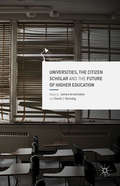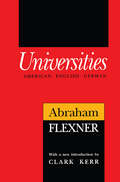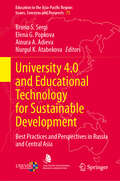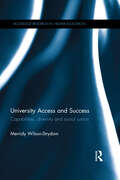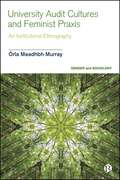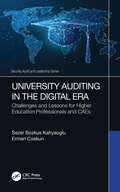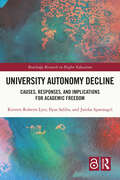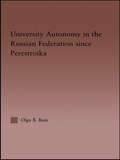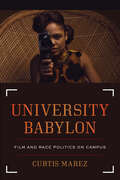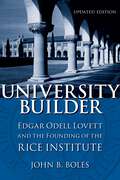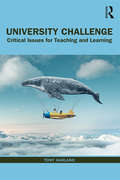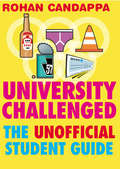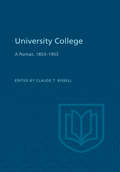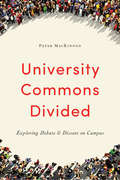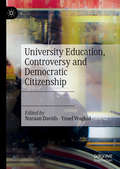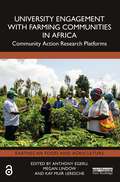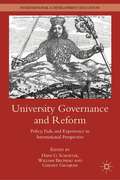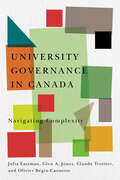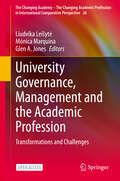- Table View
- List View
Universities, the Citizen Scholar and the Future of Higher Education (Palgrave Critical University Studies)
by David J. Hornsby James ArvanitakisThe future of higher education is in question as universities struggle to remain relevant to the present and future needs of society. The context in which learning occurs is rapidly changing and those engaged and interested in the place and position of university education need to figure out to adapt. This book embodies a vision for higher education where graduate attributes and proficiencies are at the core of the academic project, where degree programs move beyond disciplinary content and where students are encouraged to be Citizen Scholars. Through a series of cross-disciplinary and contextual cases, the contributors to this book articulate how this vision can be achieved in our pedagogical environments, future proofing higher education.
Universities: American, English, German
by Abraham FlexnerOriginally published in 1930. Flexiner’s Universities was the big book on higher education when it was first published in 1930 and continued to be such until the appearance of Robert Maynard Hutchins’ The Higher Learning in America in 1936. Universities continues to be one of the great books in the field more than sixty years later・but for quite different reasons now than then.
University 4.0 and Educational Technology for Sustainable Development: Best Practices and Perspectives in Russia and Central Asia (Education in the Asia-Pacific Region: Issues, Concerns and Prospects #75)
by Elena G. Popkova Bruno S. Sergi Ainura A. Adieva Nurgul K. AtabekovaThis book introduces &“University 4.0&” as an Educational Technology subject and studies in detail the processes of formation and development of Universities 4.0. It includes materials and applied recommendations for improving the management of Universities 4.0, as well as for the transition to Educational Technology through the creation of Universities 4.0. It also contains recommendations for improving the effectiveness of state regulation of Educational Technology in general and Universities 4.0, in particular, in the interests of sustainable development. The first part of the book forms the theoretical foundations of University 4.0 as a scientific concept, presenting a view from the standpoint of sustainable development. The second part defines the place of University 4.0 in the sustainable development strategy of Russia and Central Asia. The third part reveals best practices for creating and developing Universities 4.0 in Russia and Central Asia. The fourth part focuses on the contribution of Universities 4.0 to the sustainable development of Russia and Central Asia. The fifth part provides recommendations for improving University 4.0 management in support of the sustainable development of Russia and Central Asia. This book is suitable for scholars studying higher education, the society and economy of Russia and Central Asia, and sustainable development. It is also of interest to practising experts, university leaders and state regulators of education.
University Access and Success: Capabilities, diversity and social justice (Routledge Research in Higher Education)
by Merridy Wilson-StrydomThe challenge of widening access and participation in higher education in a manner that ensures students are successful in their studies is a major issue globally and a significant research-focus within higher education studies and higher education policy. Similarly, the challenge of under-preparedness of students entering higher education has become increasingly pertinent as universities in both developed and developing countries struggle to improve their throughput rates in a context in which schooling no longer seems to provide sufficient preparation for entering university. In this book Merridy Wilson-Strydom applies the capabilities approach to better understand university access and participation and draws on a rich case study from South Africa to critically and innovatively explore the complex and contradictory terrain of access with success. The book integrates quantitative and qualitative research with theory and practical application to provide a new framework for considering and improving the transition from school to university. University Access and Success will appeal to academics and researchers in the field of higher education internationally. The book also contributes to the growing body of international and comparative scholarship on the capabilities approach in higher education and will therefore be of value to higher education practitioners, such as those working in the promotion of teaching and learning, higher education quality assurance, institutional research and student affairs.
University Adult Education in England and the USA: A Reappraisal of the Liberal Tradition (Routledge Library Editions: Adult Education)
by Richard Taylor Roger Fieldhouse Kathleen RockhillOriginally published in 1985 this book is a critique and comparison of the nature, structure and provision of university adult education in England and the USA. The focus is both contemporary (twentieth century) and historical and is interdisciplinary, involving both social scientific and historical modes of enquiry and analysis. A central concern of the book is the liberal tradition as it has operated in its different ways and the erosion of this tradition and its consequences for the contemporary structure of university adult education form a large part of the book's discussion.
University Audit Cultures and Feminist Praxis: An Institutional Ethnography (Gender and Sociology)
by Órla Meadhbh MurrayBeing ‘REF-able’. The impact agenda. The student experience. University audit culture has infiltrated academic life, but how should we respond? Drawing on a five-year Institutional Ethnography of UK universities, the author provides a feminist take on the neoliberal university and abolitionist reflections on audit culture. For feminist and other critical academics, the interpretative power involved in audit processes provides an opportunity to collectively challenge and subvert, re-read and re-write institutions. This book challenges the myths and misinterpretations around how academic audit processes work, arguing that if we are complicit then we have agency to do them differently.
University Auditing in the Digital Era: Challenges and Lessons for Higher Education Professionals and CAEs (Security, Audit and Leadership Series)
by Sezer Bozkus Kahyaoglu Erman CoskunThis book explores how digital transformation is reshaping the manner in which higher education sectors emerge, work, and evolve and how auditors should respond to this challenging and risky digital audit universe in transforming the higher education system. It serves to help professionals to understand the reality of performing the Chief Audit Executive (CAE) role in today’s evolving business economy, specifically in the higher education sector. It compares and contrasts the stated IIA standards with the challenges and realities auditors may face and provides alternative scenarios to gaining a "seat at the table." This book also provides insight into critical lessons learned when executing the CAE role relevant for digitally transforming universities. The main purpose of this study is to rethink the audit culture in the digital era and reveal the key characteristics that are open for improvement so that digitally transforming universities can be audited according to the higher education standards with a digitally supported value-added audit approach. Based on this approach, the audit culture is reassessed considering the digital university conceptual framework and business model. There are two main points to consider for the digital university work environment: traceability and auditability. In this respect, policy recommendations are made for best practices to achieve value-added digital audits in transforming universities. The book has been written from both the reality and academic perspectives of two experienced authors. Sezer is a past CAE, CEO, and long-term senior internal auditor who has worked in the internal audit role for various listed companies, financial institutions, and government entities. Erman has extensive information technology and university accreditation knowledge in the global higher education sector. This brings a blend of value-added approaches to the readers and speaks to issues about understanding and dealing with audit culture and business evolution in digitally transforming organizations along with the requirements for upholding IIA standards. Geared toward the experienced or new CAE, University Auditing in the Digital Era: Challenges and Lessons for Higher Education Professionals and CAEs can be a tool for all auditors to understand some of the challenges, issues, and potential alternative solutions when executing the role of university auditing. In addition, it can be a valuable reference for university administrators and CIOs, as well as academics and all stakeholders related to the higher education sector.
University Autonomy Decline: Causes, Responses, and Implications for Academic Freedom (Routledge Research in Higher Education)
by Ilyas Saliba Kirsten Roberts Lyer Janika SpannagelThis book provides empirically grounded insights into the causes, trajectories, and effects of a severe decline in university autonomy and the relationship to other dimensions of academic freedom by comparing in-depth country studies and evidence from a new global timeseries dataset. Drawing attention to ongoing discussions on standards for monitoring and assessment of academic freedom at regional and international organizations, this book identifies a need for clearer standards on academic freedom and a human rights-based definition of university autonomy. Further, the book calls for accompanying international oversight and the inclusion of criteria related to academic freedom in international university rankings. Five expert-authored case studies on academic freedom from diverse nations (Bangladesh, Mozambique, India, Poland, and Turkey) are included in the volume. Drawing on both qualitative and quantitative evidence, the book offers a unique and timely contribution to the field and will be of great interest to scholars, researchers, and students in the fields of higher education, human rights, political science and public policy.
University Autonomy in Russian Federation Since Perestroika (RoutledgeFalmer Studies in Higher Education)
by Olga BainThis study focuses on the national higher education policies and institutional strategies that foster or hinder individual Russian universities in applying newfound principles of autonomy. This new autonomy has become more dramatic with the decentralization of power, transition to the market economy, and severe state austerity since Perestroika. This book suggests a model of a university that utilizes its autonomous discretion to institute innovations that build on its potential so as to overcome adverse situations.
University Babylon: Film and Race Politics on Campus (American Crossroads #57)
by Curtis MarezFrom the silent era to the present, film productions have shaped the way the public views campus life. Collaborations between universities and Hollywood entities have disseminated influential ideas of race, gender, class, and sexual difference. Even more directly, Hollywood has drawn writers, actors, and other talent from ranks of professors and students while also promoting the industry in classrooms, curricula, and film studies programs. In addition to founding film schools, university administrators have offered campuses as filming locations. In University Babylon, Curtis Marez argues that cinema has been central to the uneven incorporation and exclusion of different kinds of students, professors, and knowledge. Working together, Marez argues, film and educational institutions have produced a powerful ideology that links respectability to academic merit in order to marginalize and manage people of color. Combining concepts and methods from critical university studies, ethnic studies, native studies, and film studies, University Babylon analyzes the symbolic and institutional collaborations between Hollywood filmmakers and university administrators over the representation of students and, by extension, college life more broadly.
University Builder: Edgar Odell Lovett and the Founding of the Rice Institute
by John B. BolesRice University, one of America's preeminent institutions of higher education, grew out of the vision, direction, and leadership of one man: Edgar Odell Lovett (1871--1957). University Builder is the fascinating story of this extraordinary educator and the unique school he created. Widely acknowledged, almost from its founding in 1912, as one of America's best universities, Rice is distinguished as both the smallest and the youngest institution in the top tier of American universities. In telling the tale of Lovett and his innovative, enduring vision for Rice, John Boles provides both a compelling biographical narrative and a refreshing new view of American higher education in the first half of the twentieth century.Lovett was not a Texan; he was not even a southerner. Rather, with two Ph.D.'s in hand, he was a rising star at Princeton University when the trustees of the newly founded Rice Institute--chartered in 1891 by wealthy Houston merchant William Marsh Rice--called him in 1907 to be the school's first president. Working with a significant endowment, a vague charter, a supportive board, and a visionary's gift for planning, Lovett set out on a fact-finding tour of educational institutions around the globe. He transformed the idea of the Institute into a complete university, one that emphasized research as much as teaching and aspired to world-class status. He sought the best architect available to design the campus, lured distinguished faculty from leading universities across the globe to Texas, and constructed a far-reaching vision of a small, carefully planned, elite university that incorporated the most advanced educational practices and shaped Rice's development for the next century. Lovett served as president of Rice for nearly forty years, proving himself to be an exemplary and charismatic leader who inspired two generations of students. He was the creator of Rice University in practically every way. Indeed, perhaps no other American university has been so shaped by its founder's vision. Boles's exceptional account of Lovett's remarkable academic achievement is a vital contribution to the legacy of Rice University and an important addition to the historiography of education in the early twentieth-century South.
University Challenge: Critical Issues for Teaching and Learning
by Tony HarlandUniversity Challenge: Critical Issues for Teaching and Learning offers a nuanced and critical reading of university teaching, particularly the pressures under which academics in neoliberal, mass higher education must operate. It provides exciting thinking about slow pedagogies, powerful knowledge, the assessment arms race and the concept of vanilla teaching. Eight challenges currently encountered by those who teach in higher education are carefully examined. These include: teaching to meet all students’ needs; assessment and grading; learning to teach; and space and time in academic life. The research that underpins this work came from an international study and a conceptual re-evaluation of current practices, theories and the values of teaching and higher education. The author brings a rich understanding of university teaching as a critical and values-laden process, exploring important debates about the extent and limits of teachers’ and students’ responsibility in teaching and learning. The conceptual foundations provide a distinctive angle on some of the persistent problems which dog twenty-first-century academics working in marketised, mass higher education. This book will appeal to university teachers who wish to develop their work through scholarly enquiry and will be a resource to inform policy and management around teaching and curriculum.
University Challenged
by Rohan CandappaGoing to college or university can be a daunting experience. There are so many new experiences to try, so many new responsibilities to handle. What you really need is a best friend who'll show you the ropes, hold your hand and make sure you get to your lectures on time...This book, unfortunately, isn't that friend.This book, even more unfortunately, is more akin to the kind of mate who doesn't get up till half past two, nicks your food from the fridge and when you're both well wasted at some awful party you've gate crashed convinces you that Malibu, cider and Worcestershire sauce is a real cocktail. Frankly, if you have even the slightest ambition to emerge from your time in 'higher' education with any kind of qualification whatsoever, it's best that you stop reading now.If however, you insist on perusing the wisdom contained within this thoroughly disreputable tome, then please note that the author accepts no responsibility for the fact that you'll get a crap qualification, your parents will disown you and your subsequent career will go nowhere. But all that lies way off in the future. So let's talk about Freshers Week...'
University College: A Portrait, 1853-1953
by Claude BissellFor a century University College has had a profound and continuous influence on the cultural development of Canada. The authors of this volume show us University College as a political and educational institution; as a physical structure that has aroused admiration and scholarly curiosity; as the home of a long line of great teachers and scholars, and of a student body diverse in its origins and spirited in its attitudes; and finally, as the embodiment of an educational idea that transcends curricula and prescriptions.
University Commons Divided: Exploring Debate and Dissent on Campus
by Peter MacKinnonIn recent years, a number of controversies have emerged from inside Canadian universities. While some of these controversies reflect debates occurring at a broader societal level, others are unique to the culture of universities and the way in which they are governed. In University Commons Divided, Peter MacKinnon provides close readings of a range of recent incidents with a view to exploring new challenges within universities and the extent to which the idea of the university as ‘commons,’ a site for open and contentious disagreement, may be under threat. Among the incidents addressed in this book are the Jennifer Berdahl case in which a UBC professor alleged a violation of her academic freedom when she was phoned by the university's board chair to discuss her blog on which she speculated about the reasons for the university president's departure from office; the case of Root Gorelick, a Carleton University biologist and member of the university’s board of governors who refused to sign a code of conduct preventing public discussion of internal board discussions; the Facebook scandal at Dalhousie University’s Faculty of Dentistry in which male students posted misogynistic comments about their female classmates. These and many other examples of turmoil in universities across the country are used to reach new insights on the state of freedom of expression and academic governance in the contemporary university. Accessibly written and perceptively argued, University Commons Divided is a timely and bold examination of the pressures seeking to transform the culture and governance of universities.
University Education, Controversy and Democratic Citizenship
by Nuraan Davids Yusef WaghidThis book explores the role of the university in upholding democratic values for societal change. The chapters advocate for the moral virtue of democratic patriotism: the editors and contributors argue that universities, as institutions of higher learning, can encourage the creation of critical and patriotic citizens. The book suggests that non-violence, tolerance, and peaceful co-existence ought to manifest through pedagogical university actions on the basis of educators’ desire to cultivate reflectiveness, criticality, and deliberative inquiry in and through their academic programmes. In a way, universities can respond more positively to the violence on our campuses and in society if public and controversial issues were to be addressed through an education for democratic citizenship and human rights.
University Engagement With Socially Excluded Communities
by Paul BenneworthThis volume provides insightful analysis of the way higher education engages with socially excluded communities. Leading researchers and commentators examine the validity of the claim that universities can be active facilitators of social mobility, opening access to the knowledge economy for formerly excluded groups. The authors assess the extent to which the 'Academy' can deliver on its promise to build bridges with communities whose young people often assume that higher education lies beyond their ambitions. The chapters map the core dynamics of the relationship between higher education and communities which have bucked the more general trend of rapidly rising student numbers. Contributors also take the opportunity to reflect on the potential impact of these dynamics on the evolution of the university's role as a social institution. The volume was inspired by a symposium attended by a wide spectrum of participants, including government, senior university managers, academic researchers and community groups based in areas suffering from social exclusion. It makes a substantive contribution to an under-researched field, with authors seeking to both shape solutions as well as better diagnose the problem. Some chapters include valuable contextual analysis, using empirical data from North America, Europe and Australia to add substance to the debates on policy and theory. The volume seeks to offer a defining intellectual statement on the interaction between the concept of a 'university' and those communities historically missing from higher education participation, the volume deepens our understanding of what might characterise an 'engaged' university and strengthens the theoretical foundations of the topic.
University Engagement with Farming Communities in Africa: Community Action Research Platforms (Earthscan Food and Agriculture)
by Anthony EgeruThis book explains and explores how collaborations can be built and strengthened between African universities and farming communities to address real-world contemporary challenges. The book focuses on Community Action Research Platforms, an approach that has successfully enabled African universities to break free of the ivory tower and prove their relevance to society through deep collaborative engagements in targeted agricultural value chains. Developed in a pan-African network of universities (RUFORUM) focused on capacity building in agriculture, the approach has been tested in diverse settings over the last 15 years. The book draws on the experiences and lessons from 21 different projects initiated by RUFORUM member universities in Benin, Botswana, Ethiopia, Ghana, Kenya, Malawi, Namibia, South Africa, Sudan, Tanzania, Uganda and Zimbabwe. It highlights a critical yet underutilised role for African universities as collaborators and catalysts for multisector solutions. These are solutions that increase productivity and address climate change. They develop livelihoods and resilience in rural communities, as well as promote farmers’ access to markets, innovation and trade while safeguarding biodiversity and enhancing food and nutrition security. The book makes a case for repositioning African universities as fulcrums of development in society. It shares the rich experiences, learnings and scientific findings of diverse researchers, practitioners and students who have been working towards achieving this reality on the ground. This multidisciplinary book holds appeal for university leaders, higher education, agrifood and development specialists, researchers and practitioners, policymakers and development agencies engaged in African agriculture and rural development, higher education and sustainable growth.
University English for Academic Purposes in China: A Phenomenological Interview Study
by Xiaofei RaoThis book uses an in-depth, phenomenological interview approach to explain the generational characteristics of today’s Chinese university youths and the critical dispositions they believe indispensable in acquiring English as an academic language in and outside school settings. By presenting the authentic voices of the recruited participants, the book clarifies how English for academic purposes (EAP), as an emerging global phenomenon and a research-informed practice, enables and empowers them for conscious self-transformation and critical awareness development through language study. The book also explores issues arising in the fields of general English language teaching as well as traditional and critical EAP, and discusses university English language learners’ learning needs and rights. The book further promotes a dynamic and transformative University EAP pedagogy of particularity, practicality, and possibility moving from the oppression of language education to its liberation, and the increasing critical consciousness among the present and future university youths in a time of great social changes.
University Evolution, Entrepreneurial Activity and Regional Competitiveness
by Silvio Vismara Michele Meoli David Audretsch Erik LehmannThis book aims to bring together different contributions highlighting how the recent changes that modify universities' activities, such as the necessity to internationalize and crucially rely on third party funding, and the new entrepreneurial trajectories stemming from the recent economic-financial crisis, contribute to emphasize the existing differences between successful and lagging regions, as occurred at a country level (e. g. Southern Europe). This book should be of interest to economists, sociologists, political scientists as well as to policy makers and practitioners involved in the creation of value at a local level.
University Expansion in a Changing Global Economy: Triumph of the BRICs?
by Rafiq Dossani Martin Carnoy Prashant Loyalka Maria Dobryakova Isak Froumin Katherine Kuhns Jandhyala B. G. Tilak Rong WangThis is a study of higher education in the world's four largest developing economies—Brazil, Russia, India, and China. Already important players globally, by mid-century, they are likely to be economic powerhouses. But whether they reach that level of development will depend in part on how successfully they create quality higher education that puts their labor forces at the cutting edge of the information society. Using an empirical, comparative approach, this book develops a broad picture of the higher education system in each country in the context of both global and local forces. The authors offer insights into how differing socioeconomic and historic patterns of change and political contexts influence developments in higher education. In asking why each state takes the approach that it does, this work situates a discussion of university expansion and quality in the context of governments' educational policies and reflects on the larger struggles over social goals and the distribution of national resources.
University Finances: Accounting and Budgeting Principles for Higher Education
by Dean O. SmithAn essential and comprehensive guide to university finances.In University Finances, higher education expert Dean O. Smith • demystifies basic accounting procedures, budgets, debt financing, and financial statements• explores more unusual financial topics, such as methods for calculating fringe benefit rates, bond refunding costs, and indirect cost allocations• shows that the use of university wealth is highly restricted by donors, bondholders, government regulators, and others• answers nuanced questions, like "How are USDA formula funds calculated?" and "Why does the university pursue more and more research funding when it loses money on every grant?"• illustrates financial calculations using realistic examplesSome of these explanations are unavailable in print or online to anyone but a handful of professional accountants. Rigorous, detailed, and wide-ranging, University Finances is a unique and powerful resource.
University Governance and Reform
by Hans G. Schuetze William Bruneau Garnet GrosjeanThe fascination with the commercial value of research, coupled with the rise of neo-liberal 'new public management' in the public sector, has led to the rise of a managerial class in the university. These essays focus on the widespread use of business models and market principles that have undermined the autonomy of the professoriate.
University Governance in Canada: Navigating Complexity
by Claude Trottier Glen A. Jones Julia Eastman Olivier Bégin-CaouetteUniversities play essential roles in Canadian society. The internal and external governance of these complex institutions faces ever-evolving challenges within a rapidly shifting international context.Written by a national team of scholars, University Governance in Canada asks how institutional decisions are made and who is behind these choices. By exploring the historical evolution and regional contexts of Canadian universities, as well as current trends, the book gives readers deep insight into how these institutions are governed. The authors explore the tensions between academic governance, external and internal stakeholder expectations, and societal demands as they relate to higher education and research in Canada. Comprising a case study of six major universities, the book examines the dynamics of governance at the institutional, provincial, federal, and international levels and reveals how Canadian universities make decisions and how well they are equipped to meet current and future opportunities and challenges.Canadians invest a lot of money, time, hope, and expectations in their universities. University Governance in Canada gives policy-makers, scholars, governors, leaders at all levels, faculty, staff, students, and citizens at large knowledge and tools that will help ensure the country’s universities excel in their missions and deliver fully on these investments.
University Governance, Management and the Academic Profession: Transformations and Challenges (The Changing Academy – The Changing Academic Profession in International Comparative Perspective #26)
by Glen A. Jones Liudvika Leišytė Mónica MarquinaThis volume investigates governance and management of higher education through the lens of the academic profession. Drawing on data from the Academic Profession in the Knowledge-based Society project, an international collaborative research study involving the administration of a common survey to faculty in more than twenty countries, this volume explores important issues of governance and management in relation to, and frequently from the perspective of, the academic profession. It analyzes the complex inter-relationships and intersections between decision processes and structures at both the system and institutional levels and the experiences and perceptions of the academics who play a central role in fulfilling the mission of higher education. Theoretical chapters review key concepts that have grounded the analysis of external (system-level) and internal (institution-level) governance, while the core chapters provide original empirical research, many involving comparative studies, exploring key challenges such as managerialism, gender, shifts in faculty perceptions of influence, and the importance of communication and institutional leadership. Chapter 4,10,11 and 12 of this book are available open access under a CC BY 4.0 license at link.springer.com.
